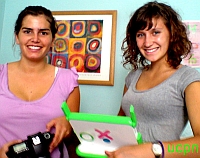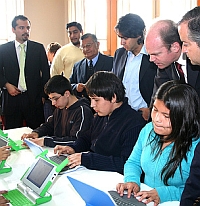I am Luis Ramirez and as many OlpcNews readers know, our citizen-led campaign called "one computer per child" in Chile is an attempt to achieve free and permanent access to computers for at least 1 million Chilean children living in poverty before our bicentennial (2010).
After ten months of work I thought it might be time to summarize part of our strategy, and our small –but nonetheless important- achievements, in case they help other people pursuing similar campaigns elsewhere. So here we go with seven ideas:
1. Unleash an appealing idea. The first thing you have to consider is this: the idea of every child having their own computer is a very disruptive one. It may sound common sense to most of us, but is definitely something that has only become possible in the last two years or so.
So, our first goal has been 'spreading the word': "Yes, we are not joking, we can really have one computer for every child in this country". And here is when we have to repeat again: this is not about OLPC's XO. It's about increasing children's opportunities with the help of ICT. We keep it children-centric and not machine-centric.
2. Align your appealing idea with broader policy issues. One of our main discoveries so far is that the idea of 'one computer per child' being only linked with education is problematic. Developing nations are not in a position to integrate these machines in their classrooms in a shorter period of time. I mean, full curriculum integration (a successful 1:1 model) is perhaps a desirable outcome, but it can easily take 4 or 5 years.
So we found a second way. A 'fast track' to OLPC based on one of the most serious problems in the Latin American region: inequality. The Chilean way to OLPC may be firstly a policy based on a principle of 'digital equality' and secondly based on an educational policy. It was actually President Tabaré Vasquez from Uruguay who first set this path. We consider is the right way to go.
3. Build upon your networks (your strength are your networks). So, you don't have money and want to run a national campaign to make your government buy thousands of laptops? And you don't even have contacts in government or in any influential circle? No problem. Someone in your network can help. Your network is your friends, and the friends of your friends both in the on-line and off-line world. You need to convince them about the 'appealing idea', that is, one computer per child. After that, everything seems easier!
4. Capture the leaders' imagination. As we are only a bunch of dreamers without any source of funding, our e-vangelization is actually a slow and time-consuming process. Thus, we have been forced to prioritize. For that reason, the single most important target audience for us has been reaching opinion leaders: politicians, key journalists, and members of influential groups. We go and talk to them. Some of them will get involved and will open other doors for you.
5. Be 2.0 (as much as you can). We at UCPN.cl are a content producer machine. Whatever we do is transformed into bytes: pics, videos, posts, press releases and so forth. And we also ask our network to do the same. This is the key reason to explain why we are among the top creators of OLPC and related stuff on the web. All what you read about viral marketing needs to be applied here, so this is the place to be smart and creative.
6. Form coalitions. During their first 10 months the campaign has been backed up by three web communities plus the student union of the oldest university in the country. Today, we added a new powerful allied to the cause: a coalition of widely renowned politicians.
It took us a couple of months but they finally agreed upon helping us. So now we are proud to announce that the Speaker of the House of Representatives and two high profile congressional representatives, all from different parties, have embraced our campaign goals.
7. Build a political consensus. As most of the readers of olpcnews know, it is not enough to have Negroponte shaking hands with Presidents. At UCPN.cl we believe we need to have a strong political consensus in order to infuse our goals with a sustainable long term perspective. So we are not only working with today's government but also to the next one.
Our strategy includes approaching future presidential candidates for the elections to be hold in 2009. Here the aim is straightforward: we want the idea of 'one computer per child' included in the candidates programs. In that way, whoever wins the election will take into the next administration our 'appealing idea'.





Hi-,
Thank you for sharing the 'recipe' on this site. We have launched a similar campaign for OLPC in the Philippines and hope to benefit from your suggestions.
Cheers,
Sandeep
"So we found a second way. A 'fast track' to OLPC based on one of the most serious problems in the Latin American region: inequality. The Chilean way to OLPC may be firstly a policy based on a principle of 'digital equality' and secondly based on an educational policy."
That is a really important point. Economic and social development is hampered in Chile and other countries because people can't afford computers, much less hook up to the internet. OPLC makes it possible for whole countries to do that, with education being just one aspect.
By the way, there is a new Negroponte interview up:
http://www.olpctalks.com/nicholas_negroponte/nicholas_negroponte_aljazeera.html
Do you have to make a sexist remark about women in your photo caption ("My kind of OLPC network support")? This caption suggests that the women in the photo are only capable tech support because of their appearance instead of who they might be as people. While this may have been unintended, it is indicative of behavior in computer science in general, and is one reason why there are not as many women in the field as their might be. I'm not going to ask you to remove the caption, just to think very carefully about what message you're trying to send to your readers.
Dear Concerned Reader:
If you implied anything besides my respect of the women for their beauty, in addition to their smarts for being XO boosters, you might want to examine your own thoughts on the matter before accusing me of being sexist.
@Sandeep: good luck with your campaing in the Philippines. Please e-mail me in case you need some help/support/advice.
@eduardo: Yes, it's true:the Latin American region is full of inequality.It's really a shame, but at the same time an opportunity. We are so inspired by Uruguay's steps precisely because on the main reasons behind their decision is inequality.
@concerned reader: I'm the author of that pic. These two Chilean college students are among the dozens of people we photograph for our campaign. Basically every single person that shows sympathy for our campaign is included.
I can assure you that we don't see the pic as sexist. Neither we consider Wayan's remarks sexist at all. On the contrary I could not agree more with him when he says: 'my respect of the women for their beauty, in addition to their smarts for being XO boosters'.
Honestly that's what we think every time we ask a women for a pic.